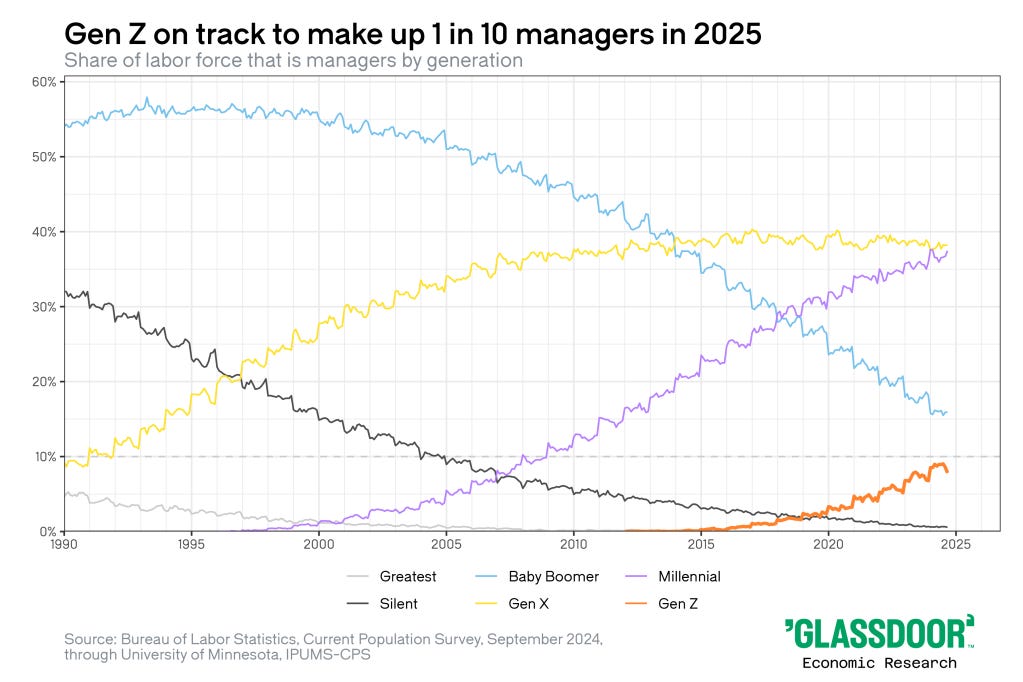Notes from the edge of civilization: November 24, 2024
Are the kids alright? Maybe not. Workplace etiquette, girl bosses, and classroom decorum in the spotlight.

In a recent survey from Intelligent.com, 8 in 10 business leaders report that their youngest hires can’t handle basic skills like taking criticism, managing conflicts, or figuring out when it’s okay to text in a meeting.
When asked which workplace skills recent college graduates struggle with, 56% of managers say these employees are somewhat incompetent or highly incompetent at taking constructive criticism. Fifty-one percent of managers also identify understanding cell phone etiquette in the workplace as an area where recent college graduates are somewhat or highly incompetent.
A significant number of managers also label recent college graduates incompetent in several areas, including addressing and resolving conflict (48%), dressing professionally (44%), exercising common sense (44%), and keeping controversial topics out of the workplace (43%). Other areas of concern include personal-professional separation (42%), professional communication—such as writing emails, answering phones, and public speaking (40%)—arriving on time for work, meetings, and appointments (41%), and time management (41%).
In response, many employers are giving their employees etiquette training, since spending the last four years on Zoom has clearly not prepared people for how to act in an office.
“Recent grads have spent most of their lives in academic institutions that focus more on theoretical knowledge and inherently give less exposure to practical skills needed to be successful in the workplace,” says Huy Nguyen, Intelligent.com’s chief education and career development advisor.
“Leaving a structured environment with clear and constant guidance to enter the professional workplace where they are expected to be more autonomous and deal with ambiguity can be a difficult transition.”
If workplace struggles point to gaps in life skills, the classroom — where many of these behaviors are first learned — is also showing cracks.
A team of Canadian researchers studied rates of classroom incivility in elementary and high schools before and after pandemic shutdowns, and have found a significant increase. They defined incivility as behaviors like texting instead of listening to a teacher, interrupting classmates who are speaking, and showing up late to class.
“Teachers reported that incivility was happening much more frequently in their current classrooms than it did prior to the COVID-19 school closures, and that there was a lack of awareness of expectations in the classroom,” says lead researcher Natalie Spadafora.
Students now interrupt lessons, yell at each other, and text during class. One Ontario teacher summed it up: “Manners have gone out the door.”
Researchers blame remote learning for this behavioral free-for-all. After all, when your "classroom" is your bedroom and your "teacher" is just a muted screen, it’s easy to forget how to function in society, if you ever knew how in the first place.
Spadafora implores parents to teach their children about manners. “It all starts with being a kind, respectful person,” she says. “If you can teach your children that at a really basic level, you’ve laid a good foundation for them to build from as they head into the classroom.”
Just as the younger set is busy redefining "rude," their older siblings are leveling up into leadership roles. Are we doomed?
While Gen Z already makes up just under 20% of the workforce, they’re also quickly entering the ranks of management. Based on current trends, one in ten managers in 2025 will be a member of Gen Z.
Get ready for “boundaries” and “burnout” to crop up in workplace conversations —because if there’s one thing this generation has mastered, it’s demanding mental health days.
A 48-year-old manager in Ireland recently wrote about how her Gen Z staff pushed her to the brink:
Newspapers and academics called them snowflakes: coddled, entitled individuals whose method of assault was online 'clap backs' - a sharp, often public response to even the mildest disagreement - and who treated HR like a drop-in centre.
We were warned, mainly from 'cancelled' academics who had found themselves jobless after mixing up a student's pronouns by accident, that they were entering the workplace and they were bringing their new, bewildering (translation: terrifying) ways with them. By 2019 I had an entire blizzard of snowflakes in my office. As Millennials had hustled their way to greater heights, I was left with a work-shy, bolshy group of individuals who believed companies should work for them rather than the other way round.
The first thing that struck me was how vocal they were. They moaned about everything: the company they had chosen to work for ('stuffy', 'boring', 'not very cool' I was told on more than one occasion). They moaned about all the senior men in the building, branding them 'pale, male and stale'- though I did have to remind them that the pale, male and stale man that owned our company was in fact paying their wages.
They eye-rolled when I said the wrong thing - 'guys' instead of 'folk' or 'them' instead of 'he/her'.
They also spoke in a weird therapy-speech that made exactly zero sense to me. They needed to 'process' everything. They felt 'triggered' by the slightest thing - changes to a deadline, presentations, clients who raised their voice occasionally.
They constantly needed to 'speak their truth' or 'own their space' and everything seemed to be 'toxic' - men or everyone in senior management. At least a third of my team appeared to have one of the 'A's as me and my older colleagues took to calling it, which is to say autism, ADHD or anxiety. And not one of them had formal diagnosis from a doctor.
And so I spent my days tiptoeing round them.
The silver lining to everything we’ve laid out above is embodied by Maxim Benjamin Smith, our guest on the most recent Collapse Life podcast. This young man is taking an alternative path to preparing for real life, working through a list of skills he is challenging himself to master.
His outlook is not just an inspiration for other young people trying to organize their lives productively, it’s also heartening for those of us in an older generation to know that people with morals, ethics, and values are out there to shape the future differently for us all.





The causes are many - TikTok, everyone gets a trophy, helicopter parents, etc., etc. The result is an entire generation that is the weakest and least prepared for anything. And soon we'll be giving them the keys to the country. As we sit on the doorstep of WW III, I have no faith that we could mount a reasonable defense, or deal with the aftermath. Of course, as a Boomer, my days are numbered anyway, but I'd hoped to leave my kids and grandkids in a better world.
I see some of this inappropriate behavior in older people who should know better, especially in the last 10 years with smart phones, where it's impossible to have a business meeting without at least a few heads too absorbed in their phones to listen to other people speaking. With this generation being the second or third into the increasingly daycare-raised environment with every second of their day being supervised, they grow up without primary attachments or the ability to cross the street by themselves or walk to a park unsupervised without some idiot calling the cops, and most recently in GA, a parent was actually ARRESTED for allowing her 11 year old boy to do so. No sense of perspective is permitted, no freedoms to explore, no demand by the supposed adults to govern themselves, so we have a generation of young adults who function at the level of autistic 3rd graders who have no idea how to think critically. Then add the covid hysteria into the mix with all of the inappropriate, dangerous & tyrannical "mandates" and they become lifelong psychiatric cases. I don't know how we get through this to some sanity, but it's going to take some sort of reset and a lot of time.